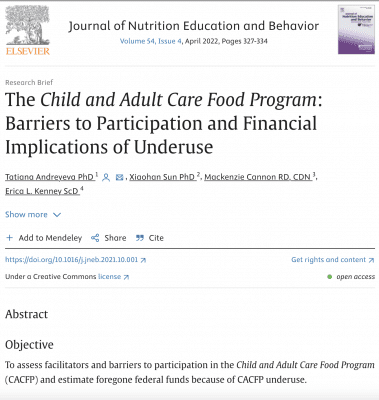Expanding CACFP
The federal Child and Adult Care Food Program (CACFP) provides financial support for quality food service in ECE programs, rendering it a key policy lever in addressing food insecurity and improving nutrition in young children.
When children eat their meals and snacks at CACFP-participating centers or daycare homes, their families could save up to $38.5 (in FY2023/2024) per child in weekly food costs. CACFP supports the success of ECE programs because without CACFP meal reimbursements, providers might need to charge higher tuition or stop serving meals. CACFP also provides nutrition education free of charge, which can benefit the ECE providers as well as the children in their care.
Despite the benefits of participation in CACFP, program utilization remains low, particularly in certain areas, limiting access to healthy meals and snacks for millions of young children. Our goal is to support expanded access to CACFP to help thousands more ECE providers to serve nutritious food to children in their care.
Read about our projects and explore resources about expanding CACFP below.
Projects
Understanding the Lost Opportunity of CACFP in Improving Child Nutrition and Reducing Health Inequities
Barriers to Participation in CACFP: Opportunities for Expansion
(2017-2019) This study aimed to understand experiences and challenges faced by CACFP-participating programs in order to identify opportunities for expanding access to CACFP. In an online survey of CACFP-participating child care centers in Connecticut, we described center experiences with CACFP, including reasons for participation, challenges with adherence to the program requirements and implementation of the revised CACFP meal patterns. We gathered center recommendations to make CACFP participation and uptake easier for child care providers and proposed policy changes for making them a reality. Finally, we provided an economic rationale for states to expand access to CACFP. We calculated the economic cost of CACFP underutilization in Connecticut, including federal funding lost due to lack of participation among eligible child care centers.
Funded by a grant administered by the Child Health and Development Institute of Connecticut and funded by the Children’s Fund of Connecticut, Connecticut Health Foundation, and Newman’s Own Foundation.
Resources
Publications
- Andreyeva, T., McCann, M., Prager, J., & Kenney, E. L. (2023). State Agency Perspectives on Successes and Challenges of Administering the Child and Adult Care Food Program. Journal of Nutrition Education and Behavior. https://doi.org/10.1016/j.jneb.2023.10.015
- Andreyeva, T., Moore, T. E., da Cunha Godoy, L., & Kenney, E. L. (2023). Federal Nutrition Assistance for Young Children: Underutilized and Unequally Accessed. American Journal of Preventive Medicine. https://doi.org/10.1016/j.amepre.2023.09.008
- Kenney E. L., Tucker, K., Plummer, R. S., Mita, C., & Andreyeva, T. (2023). The Child and Adult Care Food Program and young children’s health: a systematic review. Nutrition Reviews, nuad016. https://doi.org/10.1093/nutrit/nuad016
- Andreyeva T., Mozaffarian, R. S., & Kenney, E. L. (2022). Updated Meal Patterns in the Child and Adult Care Food Program and Changes in Quality of Food and Beverages Served: A Natural Experimental Study. Nutrients, 14(18), 3786. https://doi.org/10.3390/nu14183786
- McCann, M., Prager, J., Andreyeva, T. (2022). The Child and Adult Care Food Program: Evaluation of State Agency Websites. UConn Rudd Center for Food Policy and Health. https://uconnruddcenter.media.uconn.edu/wp-content/uploads/sites/2909/2022/06/CACFP_FactSheet-062722.pdf
- Andreyeva A, Sun X, Cannon M, Kenney E. The Child and Adult Care Food Program: Barriers to Participation and Financial Implications of Underuse, Journal of Nutrition Education and Behavior, 2021. ISSN 1499-404. https://doi.org/10.1016/j.jneb.2021.10.001.
- Andreyeva, T., Sun, X., Cannon, M., & Kenney, E. L. (2021). Implementation of minimum nutrition standards and best practices in childcare centers. Journal of the Academy of Nutrition and Dietetics, 121(12), 2454-2463. https://doi.org/10.1016/j.jand.2021.05.019
- Bauer, K. W., Chriqui, J. F., Andreyeva, T., Kenney, E. L., Stage, V. C., Dev, D., Lessard, L., Cotwright, C. J., & Tovar, A. (2021). A Safety Net Unraveling: Feeding Young Children During COVID-19. American Journal of Public Health, 111(1), 116–120. https://doi.org/10.2105/AJPH.2020.305980.
